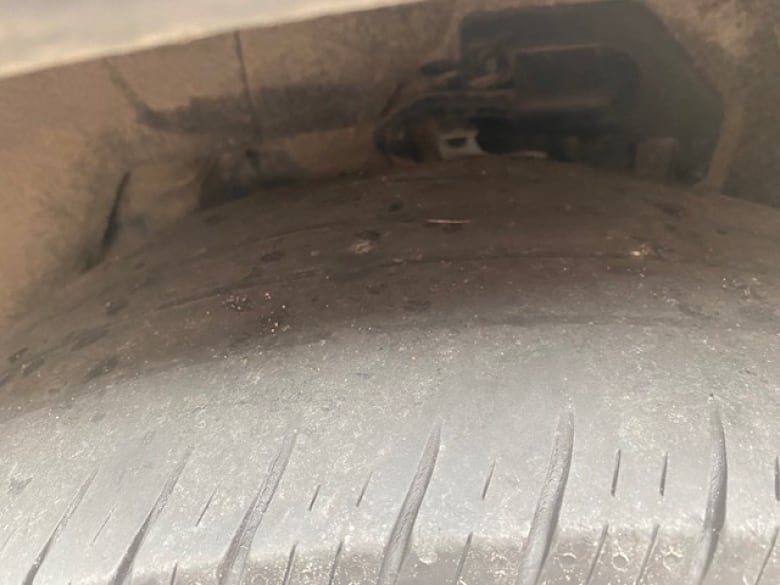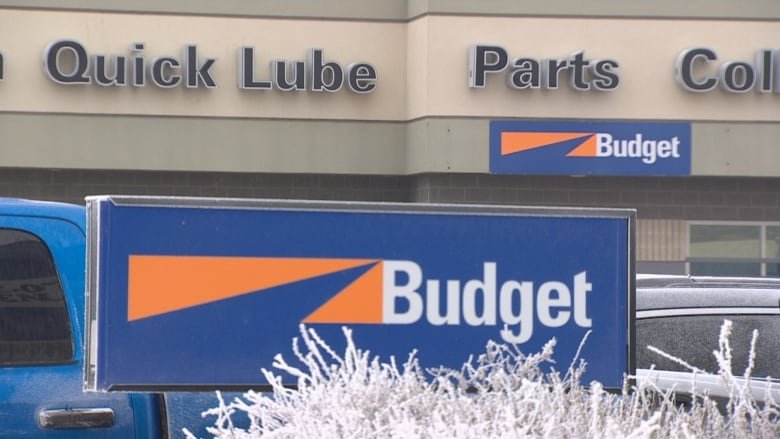When Norm Wylie’s 12-year-old daughter Sammy, who has Type 1 diabetes, asked if he would take her and a friend on a road trip from Winnipeg to Minneapolis, Minn., to see her favourite YouTube stars, he couldn’t say no.
“She gets needles, insulin injections every day and she never asks for anything, never complains. So when she said she wanted to do this, I of course said yes.”
The group had scored hard-to-get tickets to see the Sturniolo Triplets, YouTube personalities with more than 5.5 million subscribers.
- Got a story for Go Public? Contact Rosa and the team at GoPublic@cbc.ca
The plan was to rent a newer — and safer vehicle — than the one Wylie owns to make the almost 1,500 km drive to Minneapolis and back.
Instead, they got an SUV with tires so bald it sent them spinning out of control on a highway in a vehicle that legally, shouldn’t have been on the road. According to one automobile consumer protection expert, it’s a sign of the ongoing maintenance and safety issues plaguing some rental companies.
Wylie picked up his rental on Oct. 5 from a Winnipeg Budget Car and Truck Rental. He says the employee assured him that aside from a scratch in the paint, the 2022 Mitsubishi Outlander was good to go, and no walk-around inspection was done.
Budget Rental Car says thieves have been swapping out tires on its vehicles, which could have resulted in a Winnipeg man’s rental SUV spinning out on a highway. The Budget franchisee says it’s reviewing its policies.
Less than an hour into the drive, it started raining. Sammy and her 13-year-old friend, June Burnett, were in the back seat.
“I could feel the vehicle hydroplaning,” Wylie told Go Public.
“The next thing you know, we’re doing 360s down the highway. The girls are screaming. I’m screaming. And then we flew backwards into the ditch.”

‘Checkered record’ on maintenance
“It was like a bad rollercoaster,” said Sammy.
“My first thought was like, why is it happening? And the second was, I wasn’t going to be able to go to the show.”
Wylie says he was stunned and grateful no one was hurt.
Vehicle rental companies have a “checkered record” when it comes to maintenance, says George Iny, who heads up the Automobile Protection Association (APA).
He noted that safety can take a back seat to keeping vehicles on the road, a situation that was made worse by the pandemic and the vehicle shortage that followed.

“The difference now is the pandemic has required them to be renting older vehicles and keeping vehicles in their fleet longer. And these vehicles are going to need more maintenance and probably a more robust inspection program,” Iny said.
Go Public asked Avis Budget Group, which oversees Budget Car Rental franchise locations, if that’s the case with their vehicles, but they didn’t answer the question.
Car rentals are big business. More than 3.7 million Canadians rented a vehicle last year, and those rentals brought in billions in revenue last year, according to market research company Statista Market Insights.
Tire specialist examined treads
After the accident, Wylie got the rental towed to his in-law’s house, then borrowed their car to continue the road trip. When he got back, a family member pointed out how thin the tire tread on the rental looked.
Instead of returning the SUV to Budget, Wylie decided to take it to a tire specialist at Kal Tire, which performed the tire inspection for him as a free service.
The Kal Tire paperwork shows the tread on the rear tires was just 0.8 mm — half the minimum 1.6 mm that’s required in most provinces, including Manitoba, where Wylie lives.

Kal Tire found the front tire treads were within legal limits at 4.88 mm, but that could have added to the problem, Iny wrote in an email to Go Public after looking at the results.
“The uneven tire measurements could contribute to the loss of control,” he wrote. “The back tires are very worn and could let go with no warning in rain or snow.”
MPI, the public insurer in Manitoba, recommends a tread of at least 4.8 mm to increase safety when road conditions are poor.
The fact Budget would rent him a vehicle with such thin treads is “completely inexcusable,” Wylie said.
“How can they put me on the road like this in this type of vehicle?”
Franchise owner blames possible tire thieves
Wylie complained to the franchise owner by email. In his response, Don Johal apologized, saying that even before the accident, he had already been “reviewing and re-developing” the vehicle inspection and maintenance program at the locations he oversees.
He told Wylie the new procedures include 15 point inspections by outside service providers every 9,000 km, a 70 point inspection when vehicles hit 40,000 km, and a plan to redesign the vehicle inspection slips to include a separate section for tires only.
“That’s pretty convenient timing,” Wylie said. “Why wasn’t it in place before?”
In his email to Wylie, Johal also blamed tire thieves, saying at times, good tires have been swapped out for bad ones while the vehicles were rented out or sitting on the Budget rental lot at night.
He said he’s added security cameras and posted signs to deter theft.
Iny and another expert say it does happen, but it’s rare. Wylie says the owner is just passing the buck.
“Basically saying ‘It’s not our fault that these people are doing these things,'” he said, noting Budget should have checked the tires before renting him the vehicle if tire theft is a known problem.

Budget, Avis won’t share maintenance records
Budget credited Wylie the $105.53 he spent on the rental, but when he asked the company to provide the maintenance records for the SUV, so he could see for himself what safety checks had been done, that request was ignored, he says.
When asked, Avis Budget Group didn’t send the records to Go Public either.
Their head office also didn’t answer specific questions about their safety and maintenance policies for all their locations, including Go Public’s request to make them public so customers can see what’s being done.
Instead the company sent CBC News a short statement.
“All Budget locations, including independently operated franchised locations like the one that was rented to Mr. Wylie, are expected to adhere to the Motor Vehicle Safety Act, as well as our safety and franchise guidelines,” they wrote in an email to Go Public.
“We have instructed this location to follow these policies and are taking preventative steps to avoid this happening in the future.”
Transport Canada sets vehicle standards for manufacturing under the federal Motor Vehicle Safety Act. Provinces and territories cover laws around the safe operation of vehicles on public roads.
Under those laws, vehicle owners can face suspended vehicle registrations, mandatory inspections and fines up to $500 for driving unsafe vehicles, depending on the province.
More consumer protection needed: expert
Experts say a tougher, more specific law for rental companies is needed, because rentals are often driven harder than the average vehicle and by people unfamiliar with the make and model, leading to more wear and tear.
It’s not clear who owns the rental Wylie was given that broke the tire tread rules in Manitoba. Neither Avis Budget Group nor the Budget franchise would say.
Neither Transport Canada nor the individual provinces and territories have laws that specifically hold rental companies responsible for unsafe vehicles.
Canadian consumer lawyer Jeff Orenstein gives advice about what to do when rental vehicles don’t meet safety standards.
California introduced a law last year that clearly says the rental companies themselves need to ensure the vehicles they rent are “mechanically sound and safe to operate.”
“It puts them on notice,” said Michael Brooks, the executive director at the Center for Auto Safety in the U.S.
“We’re making sure that every time that rental vehicle comes back to the facility, it’s checked out, deemed safe and can go back out to be rented to another person.”
Even without a specific vehicle rental law, Canadian consumer lawyer Jeff Orenstein says that doesn’t mean short-term rental companies are off the hook, but it can leave consumers to prove negligence in court.
“It seems fairly clear to me that when a rental company is giving you a vehicle, it should be in proper working order,” said Orenstein, the owner of Consumer Law Group.
“It’s not good enough for them to say, for example, ‘We’re trying our best. We’ve had problems in the past where we put up cameras in our place.’ That’s really not sufficient.”

Norm Wylie, his daughter Sammy Wylie and her friend June Burnett, who was on that road trip, say they would like to see Canada beef up its laws and place more responsibility for unsafe vehicles on the rental companies.
Sammy says it’s “totally crazy” Budget would give them an unsafe vehicle.
“That is the most unresponsible thing you can do.”
Burnett agrees. “The car could have just as easily flipped over and we could have died,” she said.
Submit your story ideas
Go Public is an investigative news segment on CBC-TV, radio and the web.
We tell your stories, shed light on wrongdoing and hold the powers that be accountable.
If you have a story in the public interest, or if you’re an insider with information, contact gopublic@cbc.ca with your name, contact information and a brief summary. All emails are confidential until you decide to Go Public.






